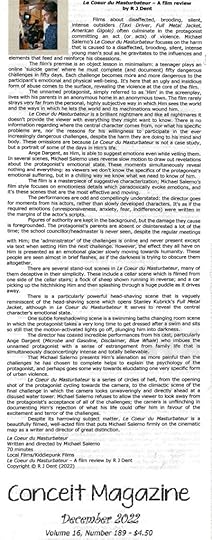R.J. Dent's Blog, page 7
March 27, 2023
T Y P O 2
Journal of Lettrism, Surrealist Semantics & Constrained Design

T Y P O: Journal of Lettrism, Surrealist Semantics & Constrained Design
TYPO 2 is now available
Contents include: alien alphabets, prismatic subdivisions, principles of double-talk, Post-Neoist portraits, desiring specimens, asemic architecture, Paul Éluard poetry, titular typography, Surrealist trivia, Italian eye candy, curlicues in review, generic sheet music, Jarry on the English language, historical filler text translations & much more

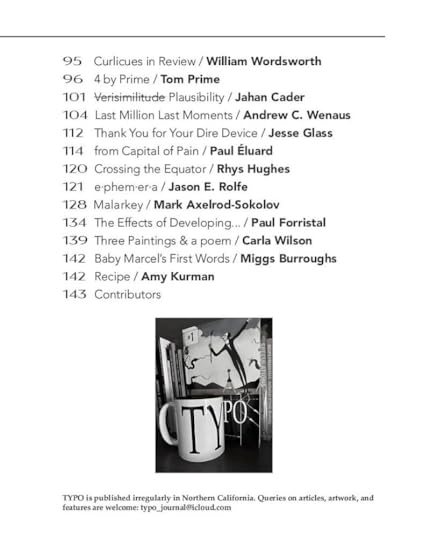
Journal Details:
Title: TYPO 2
Author: Various
Language: English
ISBN 979-8-9869224-5-4
Format: Paperback Journal
Pages: 152
Publisher: Black Scat Books
Contributors:
Pierre Albert-Birot; Guillaume Apollinaire; Mark Axelrod-Sokolov; Tom Barrett; Allan Bealy; Miggs Burroughs; Jahan Cader; Janina Ciezadlo; Norman Conquest; Farewell Debut; R J Dent; Karen Eliot; Paul Éluard; Paul Forristal; Ryan Forsythe; Jesse Glass; Rick Henry; Rhys Hughes; Rory Hughes; Alfred Jarry; Richard Koman; Márton Koppány; Amy Kurman; Peter F. Murphy; Pata-No UN LTD; Gaston de Pawlowski; Derek Pell; Harry Polkinhorn; Tom Prime; Jason E. Rolfe; Ded Rysel; Doug Skinner; Giovanni Antonio Tagliente; Félix Vallotton; Andrew C. Wenaus; Adolphe Willette; Carla Wilson; William Wordsworth.
Publisher’s details: https://blackscatbooks.com/2023/03/27/typo-2
Purchase links:
US: https://www.amazon.com/dp/B0BZFLSJ95
UK: https://www.amazon.co.uk/dp/B0BZFLSJ95
Aus: https://www.amazon.com.au/dp/B0BZFLSJ95
Can: https://www.amazon.ca/dp/B0BZFLSJ95
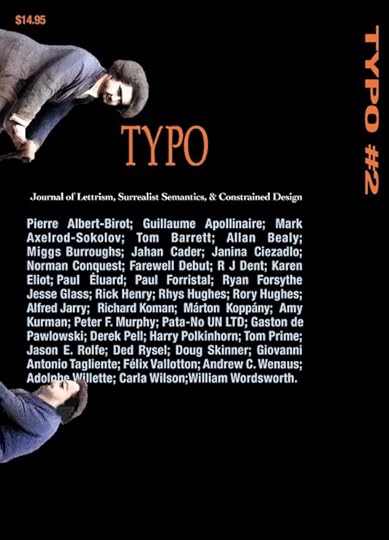
March 20, 2023
The Songs of Maldoror – a mini-review
by cegesteorphee

‘My choice for World Poetry Day is Lautreamont’s Les Chants de Maldoror – this edition by https://www.infinitylandpress.com/ is the best edition in English IMO…’
Book details (Infinity Land Press): https://www.infinitylandpress.com/the-songs-of-maldoror
Book details (Translator’s website): http://www.rjdent.com/the-songs-of-maldoror-2/
March 14, 2023
Moonstone Silhouettes
by R J Dent

Moonstone Silhouettes is a poetry collection by poet, novelist and translator R J Dent.
Inside Moonstone Silhouettes, the reader will a selection of unique characters and surreal landscapes. The collection also contains elegies for lost friends and poems in praise of literary influences, as well as modern translations of French and ancient Greek poems.
Underlying this collection of intense, vibrant and evocative poems is a poetic vision that transforms the subject matter into a celebration of the ethereal and the mystical.
Book details:
Title: Moonstone Silhouettes
Author: R J Dent
ASIN: B004MME1GG
Language: English
Publisher: Inclement Press
Formats: Paperback and ebook
Pages: 35
Dimensions: 7 inches x 5 inches x 0.25 inches
Cover art: Robert J. E. Simpson
Praise for Moonstone Silhouettes:
‘Accomplished… the poetry has a resonance’ – K.M. Newmann (Summer Palace Press)
‘Good – clear, witty and interesting’ – Matthew Taylor (Monkey Kettle)
‘The poems are well-crafted and have things to say’ – Patricia Oxley (Acumen)
‘Obviously excellent’ – Barry Tebb (Sixties Press)
‘Very American in style… the epitome of work I like to publish’ – Ian Deal (Poet Tree)
‘Interesting and atmospheric’ – David Caddy (Tears in the Fence)
‘Hauntingly beautiful’ – Josephine Austin (First Time)
Purchase link (UK): http://www.amazon.co.uk/dp/B004MME1GG/
Purchase link (US): http://www.amazon.com/dp/B004MME1GG/
Purchase link (Aus): http://www.amazon.com.au/dp/B004MME1GG/
Purchase link (Can): http://www.amazon.ca/dp/B004MME1GG/
March 12, 2023
Tom Banger on The Songs of Maldoror
A review
‘…but just leafing through Maldoror, I can see that R J Dent’s translation is a game changer and will transform the experience of this mind-blowing work for English speaking readers…’
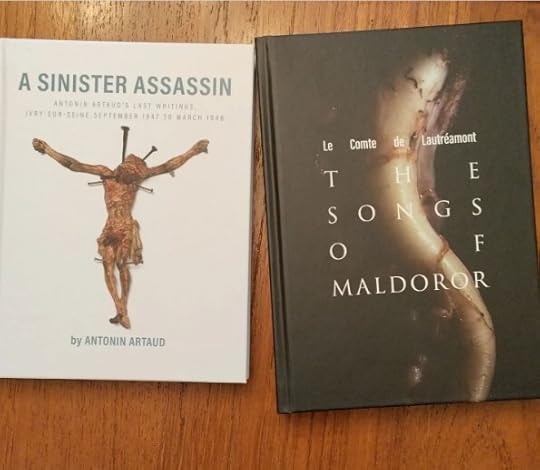
‘And this too! I’m not too familiar with Artaud’s work, but just leafing through Maldoror, I can see that RJ Dent’s translation is a game changer and will transform the experience of this mind-blowing work for English speaking readers. It is written in clear English, true to the original, but lacks the stilted formality of the Lykiard and Knight translations. Can’t wait to rediscover this classic!’
Tom Banger
Book details (Infinity Land Press):
https://www.infinitylandpress.com/the-songs-of-maldoror
Book details (R J Dent):
http://www.rjdent.com/the-songs-of-maldoror-2/
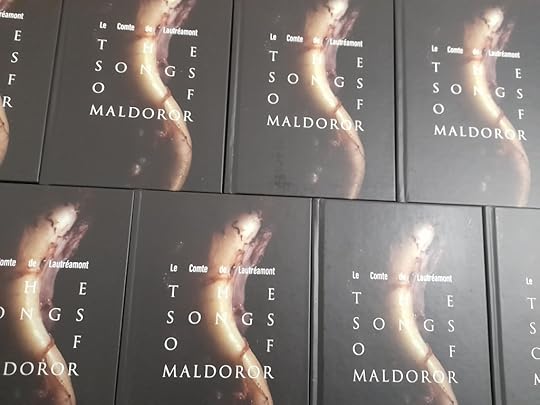
March 8, 2023
Eight poems by Paul Eluard, read by Listen to Poetry
Eight of my English translations of Paul Ėluard’s poems from Capital of Pain have been recorded and read by Listen to Poetry. The link to the audio files is here: https://listentopoetry.com/paul-eluard/

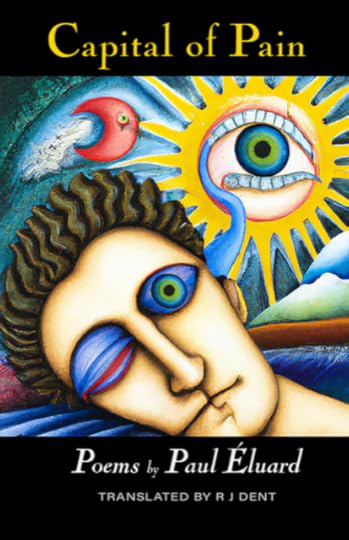
March 6, 2023
Chest of Wonders by R J Dent
His heart pounding hard, Stephen opened the lid of the wooden chest and looked inside.
Everything else around him – the slight chill of the large, but badly-lit loft, the musty smell, the brown solidity of the rafters, the roof lining that smelled (and looked) like old potato sacks, the roughly-rendered brick chimney-breast, the cobwebs, the items of no-longer-needed-or-used furniture, the bags of steadily mildewing clothes, the scuttlings and occasional cheeps of the birds, possibly martins, nesting under the eaves – suddenly faded away to nothing as his attention and concentration zeroed in – like the beam of the black rubber-coated torch he held in his right hand – on to the contents of the old wooden chest.
Paper!
His initial feeling was one of disappointment, but as his eyes took in the many different coloured cardboard document wallets, the stacks of notebooks, the collection of diaries, the envelopes with the name MR ROGER BROOKS and an address typed on the front, Stephen’s emotion changed to one of over-whelming curiosity. It took him a few moments to realize that he had made an exciting and possibly very important discovery.
Continue reading: https://www.booksie.com/posting/r-j-dent/chest-of-wonders-690718

R J Dent on TikTok
Books, trailers, talks, readings… all things book-related by R J Dent: https://www.tiktok.com/@rj.dent.com?lang=en

March 4, 2023
Myth by R J Dent
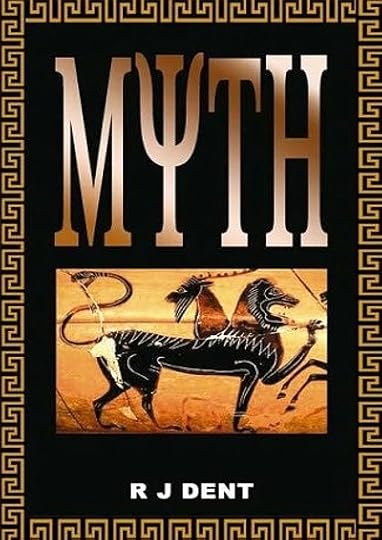
Myth, written by R J Dent, is a horror/fantasy novel set on a Greek island.
Synopsis:
R J Dent’s novel, Myth, is now available in paperback and e-book formats.
Myth is a dark, erotic horror/fantasy novel set on a Greek island. It tells the story of a holidaying couple who hear about the chimera, a strange mythical creature that lives in the hills. They, of course, are skeptical, but also curious. Eventually, curiosity wins out and they set off with a guide, up into the hills to see the chimera for themselves. Obviously things aren’t as they seem and the couple end up trapped in the hills, fighting for survival against a ferocious enemy with multiple hearts of darkness; a relentless and savage being that will not stop until they are both destroyed.
Book details:
Title: Myth
Author: R J Dent
ISBN (10): 1843862670
ISBN (13): 978-1843862673
Pages: 262
Format: Paperback and ebook
Language: English
Publisher: Vanguard Press
Weight: 299 grams (10.54 ounces)
Dimensions: (7 inches x 4 inches by 0.75 inches)
Purchase link (Aus): https://www.amazon.com.au/dp/1843862670
Purchase link (Can): https://www.amazon.ca/dp/1843862670
Purchase link (UK): https://www.amazon.co.uk/dp/1843862670
Purchase link (US): https://www.amazon.com/dp/1843862670
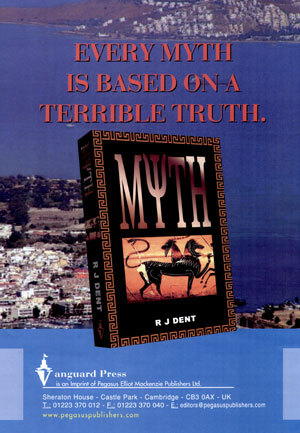
February 14, 2023
‘You don’t find Maldoror – it finds you’ – R J Dent interviewed by Gabriel Hart
On 1st October 2022, Infinity Land Press published R J Dent’s English translation of Le Comte de Lautreamont’s The Songs of Maldoror. The resulting book is a high-quality hardback book with 37 full color illustrations by Karolina Urbaniak. The book has a foreword by Audrey Szasz and an Afterword by Jeremy Reed.

Gabriel Hart interviewed R J Dent to find out what drew him to translate such a challenging and controversial work.
GH: What is your history with and attraction to Maldoror? Was this a personal long-time goal to update its translation or something that fell into your lap?
RJD: I read Maldoror in my twenties. The first version I read was the Penguin Books edition. That particular English translation always seemed a bit imprecise to me and consequently some of the book’s meaning was lost or obscure. Also, I didn’t realize that the translator had not translated Maldoror in its entirety; in that particular translation there are over fifteen significant paragraphs missing from Lautréamont’s original text.
A few years later, when I wanted a project to follow my English translation of Charles Baudelaire’s The Flowers of Evil, I considered attempting my own translation of The Songs of Maldoror and, probably inevitably, wondered if I could translate it in a way that made its meaning clearer. So yes, it was a personal long-time goal to take Lautréamont’s text and bring it into the twenty-first century. No matter when it was written, it’s a twenty-first century text.
GH: I’ve seen book translations go three ways: 1.) the literal word for word approach— which often makes for a clunky read like some attempts with Bataille, 2.) the emphasis on poetics, which can sometimes be misleading and undermine the author’s intentions, and 3.) a conscious effort towards concision, which, after comparing this new version with a couple older versions of Maldoror, seems to have been your approach. What was your personal aim with this translation project?
RJD: With my translation of Maldoror, I tried to stay as close to Lautréamont’s original text as I could, but I also tried to translate the text into the English text that Lautréamont might have written if he had written Maldoror in twenty-first century English.
There were four English versions of Maldoror when I started translating it: John Rodker’s (1924), Guy Wernham’s (1943), Alexis Lykiard’s (1970) and Paul Knight’s (1978). I had to thread my way between all four of them using my own vocabulary, mainly because, as you may have noticed, they each used quite old-fashioned language, full of archaic phrases and words, many of which have fallen out of use. Paul Knight’s version over forty years old and was the most recent translation until mine and that version is over forty years old.
I start the translation process with a sentence to sentence, paragraph to paragraph conversion. When I finish it, that’s the first draft. Even then, certain words or phrases from nineteenth century French won’t translate because the meaning has been lost over time, or there are too many choices available in English. When that happens, and it happens regularly, I tend choose the word or phrase in English that is the most modern, and which has the most resonance. An example of this is in a short piece of text I translated from a story by the Marquis de Sade. The story had someone stating that once a person mentioned something, then fairly soon, the thing they had mentioned would put in an appearance. The sentence was: “Quand on parle du loup on en voit la queue,” which is: “When we mention the wolf, it is not long before we see its tail.” It’s an old French saying, once literal, now figurative, which derived from a phrase that was once used in shepherding communities. I had to decide whether to keep the phrase as it was, but in English, or to change the whole phrase into something more contemporary – and more familiar for English readers. I’m not going to reveal what my final choice was, as that particular story is not yet in print, but that’s the kind of decision I frequently have to make during the translation process.
GH: I initially heard of Lautréamont, when my first editor was looking over my manuscript. The next day he bought me a copy of Maldoror, presenting it as “the most evil book ever written.” In the afterword to this new edition, Jeremy Reed’s writes Lautréamont “was by nature a psychic terrorist and certainly the most dangerous writer the 19th century was to produce.” What is your take on these pervading claims?
RJD: I’m not sure Maldoror is ‘the most evil book ever written’, but it is a book that has a lot of evil acts described in it. The narrator describes his evil acts in great detail. The author does not flinch from writing about them and his tone is celebratory. That sensibility is apparent in the book’s illustrations. Karolina Urbaniak has created 37 full color illustrations for this book – her photos look like paintings and they really capture the darkness and the despair of Maldoror, as well as tap into the savage beauty that is at its heart.
I really like Jeremy Reed’s afterword; it’s entertaining and very informative. His claim that Lautréamont ‘was by nature a psychic terrorist’ is interesting in light of the effect that Maldoror has on some readers, as is the fact that the Surrealists discovered and championed Maldoror. Another way in which Lautréamont can be seen as ‘a psychic terrorist’ is due to Lautréamont being the pseudonym for Isidore Ducasse, a young man who wrote The Songs of Maldoror, a very dark and very disturbing novel in which he described a whole range of paraphilias and horrors, including sadism, masochism, necrophilia, rape, bestiality, and murder, in the most celebratory tone possible.
As for Lautréamont being the nineteenth century’s ‘most dangerous writer’, I think Jeremy Reed is right about that. A few years ago, someone said: “Once you’ve read Maldoror, you’ll never forget reading it – and you’ll never recover from reading it.” Having read it several times, and having now translated it, I totally agree with that – it is an unforgettable reading experience, and it’s a book which, once read, changes the reader in the same way that reading The Room by Hubert Selby Jr., will change the reader.
GH: Because so little is known about his life, Lautréamont is assumed or rather imagined to be like his character Maldoror. Yet once the book came under fire, Ducasse may have pandered to pressure when he said, “I have slightly exaggerated the pitch so as to do something new in the direction of this sublime literature which sings of despair only to oppress the reader and make him desire the good as a remedy.” Do you really believe this was his intention, or could he have been avoiding simply standing by its brutality?
RJD: One should only trust the work, and not the author’s claims about the work. Lautréamont was the pseudonym that Isidore Ducasse used when he published The Songs of Maldoror, therefore, nothing Lautréamont says is true, or rather, everything that Lautréamont says is fiction. I also feel that there needs to be a very clear distinction between Isidore Ducasse, who published his first book, The Songs of Maldoror, using the pseudonym Le Comte de Lautréamont, and Isidore Ducasse, who published his second book, Poésies, under his own name. It’s the age-old dilemma – author intention. We can never know what Lautréamont intended – and even if we could have interviewed him, he may have had answers specifically prepared and designed to promote the book.
GH: Do you think Lautréamont may have been stung by the darkness he tapped into, and it could have actually terrified him? When he said in 1870 with the publication of Poésies, “I have completely changed my method, to sing exclusively of hope, optimism, CALM, happiness, DUTY,” it contrasts heavily with Maldoror’s negativity.
RJD: The sentence you have just quoted is from one of Ducasse’s letters and it’s complicated by the fact that it is Isidore Ducasse, the author of Poésies, who is making that claim about Maldoror. He wrote that letter a year after Maldoror was published and it can therefore be read as an exercise in damage limitation. He was also trying to prepare the way for his second book, Poésies, which he was then writing. He would go on to present Poésies as a polar opposite to Maldoror, with Poésies as the white, good, yang book, and Maldoror as the black, evil, yin book. So, no, not stung by the darkness; more a case of wanting to make sure potential readers knew that Maldoror and Poésies were opposite sides of the same literary experiment. It’s also useful to remember that Ducasse considered cutting some of the more extreme passages from Maldoror. In the letter you quoted from, he said: “I could in later editions cut out some of the passages that are too powerful.” It’s very fortunate for us that Isidore Ducasse did not do that. Some writers continue to revise their work their whole lives – Walt Whitman is a famous example; he never stopped revising, editing and adding to Leaves of Grass; the 1855 edition is very different to the ‘deathbed’ edition. Many believe that the 1855 edition is the more powerful collection – and they may have a point as that’s the edition that launched Whitman’s career in poetry. Later editions are considered weaker. It’s terrible to think that if Ducasse had successfully cut the passages that he considered to be ‘too powerful’, Maldoror may had become weaker, perhaps even lost to us forever.
GH: How would you interpret Audrey Szasz’s quote from her foreword, “You don’t find Maldoror—he finds you.”?
RJD: I think that that’s a reference to the character of Maldoror, rather than the book itself. I think it’s probably true, but with one minor revision: I think the quote should be: “You don’t find Maldoror – it finds you.” The book finds its way to some readers. Not everyone encounters Maldoror. It only appears in the lives of certain people. It is most definitely not for everyone. It has been around since 1868 and yet only a few people have read it. The litmus test is: Do you know four people who have read Maldoror?
I like the fact that, at the beginning of his book, Lautréamont warns his readers to stop reading Maldoror, as it is most likely not for them and could harm them if they continue reading: “It is not right that everyone read the pages that follow; very few will be able to taste this bitter fruit without danger. Consequently, stop, turn around, go no further. Listen to what I say: stop, turn around, go no further…”
Lautréamont’s warning, which some have suggested is actually a dare or a challenge, is clear enough – Maldoror is not a book for everyone. It is dark, depraved and deranged. It is a dangerous book to read. It leaves readers bruised. Changed. The Songs of Maldoror is very much a subterranean classic of French literature. There’s nothing else like it.
The Songs of Maldoror
by Le Comte de Lautréamont
Translated into modern English by R J Dent
Illustrated by Karolina Urbaniak
Published by Infinity Land Press
https://www.infinitylandpress.com/
Maldoror details at Infinity Land Press: https://www.infinitylandpress.com/the-songs-of-maldoror
Maldoror details on R J Dent’s website: http://www.rjdent.com/the-songs-of-maldoror-2/

